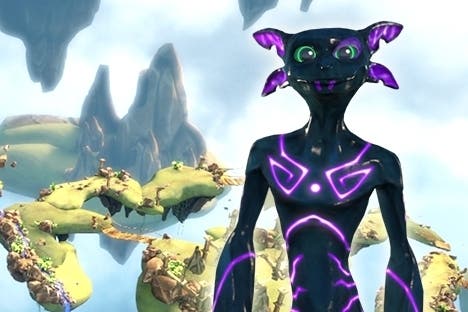"Glorious entertainment": Science and games intersect at this year's Make Something Unreal competition
Give peas a chance?
When switching from PowerPoint to a live build something goes awry, and the big screen in the Darwin Room suddenly fills with endlessly unspooling code. "Gah! This always happens," says the game designer handling the presentation, before tapping at his keyboard and muttering darkly.
For a minute, I doubt his world-weary demeanour. This always happens? The designer looks about 12. Then I cast a quick glance around the audience gathered here and realise he's just one boy genius amongst many boy - and girl - geniuses. Maybe when you're running with these crowds, this sort of thing really does always happen.
We might be gathered in the Darwin Room here at the Wellcome Trust's London offices, but we're honouring another scientific legend today: Gregor Mendel, the Augustinian friar who once looked at some peas very closely (as we all do from time to time) and started to unravel the mysteries of genetic inheritance (as most of us don't). The reason that these game designers are involved - these student game designers, in fact - is that Mendelian inheritance: genetics and genomics is the theme for this year's Make Something Unreal competition. How unshakingly populist.
The annual competition's been running for a few years now and it provides a venue for university students to come together and create games, getting to grips with the Unreal Development Kit and learning from mentors who work for professional studios. For the 2013 event, finalists were whittled down from 22 different teams, and the four groups I'm visiting today will eventually go on to the hallowed halls of the Gadget Show Live where a winner will be crowned.
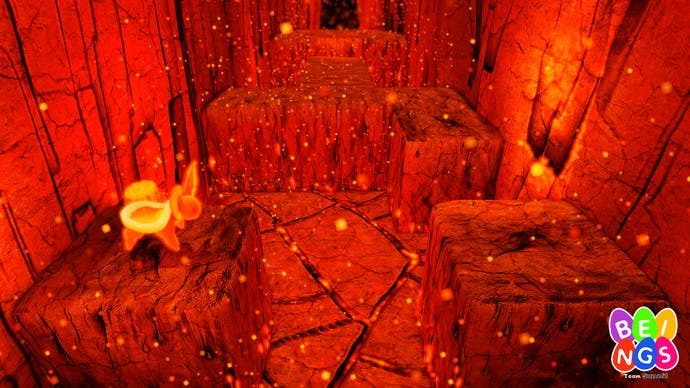
All that electro-pomp and future-shocked pageantry's a few months off, though: today's mostly about getting together, briefing one another on how the individual projects are coming along, and honing those crucial pitching skills. At the Gadget Show Live, the teams will have to deliver regular presentations to passing crowds on where their game is currently at in the development cycle, and that's harder than it sounds. "Nobody wants to see code on screen during a presentation," says one of the mentors as our boy genius tries to get back to his live build. It actually looks sort of cool, rattling by in all its hectic complexity, but he's got a point.
I'm not sure what I expected from Make Something Unreal, but I don't think I expected what I'm actually seeing today. I think I probably assumed this was a smart marketing move from a canny software company, with a very thin coating of practical stuff layered on top: the ludic equivalent of a Rice Krispies cake recipe. In truth, it's a smart marketing move from a canny software company with a very, very thick coating of practical stuff layered on top. Most of the students I talk to are familiar with the UDK anyway by this point - they're in the second and third years of their degree courses, and many of them encountered it in their first. Meanwhile, Epic, in collaboration with the Wellcome Trust, is giving them a real taste of the pressures of game design: there are milestones to hit, designs to perfect, features and systems to code, and feedback to take on board at every stage.
Lots of feedback, actually - and this is probably the most heartening aspect of the whole thing. I'd cynically imagined the overall tone of the competition might be rather soft and patronising: You've got some graphics moving on screen, well done. Here's a signed picture of Marcus Fenix, and a Bulletstorm bottle-opener that calls you Dicktits when you crack a Bud. Instead, the critiques spill forth constantly and with a energising sort of precision, like a very narrow, very fast-moving mountain stream that doesn't much like your health-and-mana UI. You're not showing enough of the game! You're talking too slowly. You're talking too quickly. That feature doesn't accurately represent the science. Your menu is a bit confusing. Nobody's getting a Bulletstorm bottle opener today.
I genuinely feel for the first group to take the stage in the mock presentations, actually. Team Summit is the smallest of the outfits, I think, heralding from the University of Abertay with a puzzly children's platformer called Beings. They're aiming high - hoping to achieve "the polish of a Nintendo or Blizzard game" in fact - but since they're kicking proceedings off, they also get blasted with all the general feedback that could probably apply to every presentation that follows: stop reading from notes, stop taking too long to get to the point, why aren't you explaining what the game's about at the very outset?
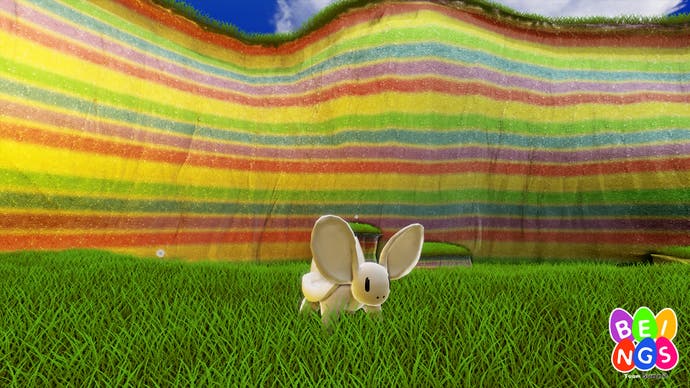
What this game's about, I gather, is sex and death - a funny pitch for a children's game, but then these are funny times, right? Set in a series of bright, colourful play areas, Beings sees you powering up your cute rabbit-like creature, and then mating with any cute rabbit-like creatures that happen to be nearby. At this point, a little thing I like to refer to as Mendelian inheritance: genetics and genomics starts to take over, and there's the chance for your creature's offspring to evolve useful powers that will help them get to the next area. If they're suddenly flame resistant, they can walk through a fiery cavern, for example. I have been led to understand that this is how human relationships unfold, too. Your dad's flame resistant and your mother has rickets? You've probably got a flame resistant brother as a result, while you yourself may have very hot rickets.
There's some discussion from the science team as to whether Summit's got the theory down pat - if these are recessive traits that are being modelled, why do so many of the offspring created have handy fireproof fur at the end of it? Overall, though, it's a lovely piece of work: the animation's really expressive, the environments have just the right level of sugary detailing, and the mating is accompanied by appropriate blasts of saxophone music, exactly like real mating.
When I catch up with the team after the presentation, they've put science aside for the time being to ponder more difficult matters - whether their tagline's any good. "The tagline is, 'It's all about beings the best,'" says Clement Marcou, while the spirits of a million distressed marketing professionals wail in the darkness like injured antelope. "We try to put a subliminal message in it," he elaborates, leaning in. "The subliminal message is, "We are the best". If there's one tiny chance it would help with judges we'll take it."
Summit's not alone in thinking genetic inheritance is a good match for a clever spin on gear-gating. Hailing from Staffordshire, a university whose logo, if memory serves, used to look like a very learned pretzel, are Kairos Games , who are putting together an ambitious project called Polymorph.
If Epic's searching for a good example of how its engine can get even newish designers up and running fairly quickly - and I'm guessing the company wouldn't say no to such a thing - Polymorph is probably it. The demo is massive and colourful and surprisingly complex, and only the little details, like the rather weightless animations, mark it out as a work in progress. Polymorph turns genetic traits into a kind of load-out for your main creature, I think, and as you explore this bright, breezy platforming world you're picking between two different sources of genes in order to build up the skills necessary to get you from A to B. One mutation might leave you with a rhino's horn, for example, which is presumably good for combat. Another may grant you wings, which are good for gliding from one patch of land to another.
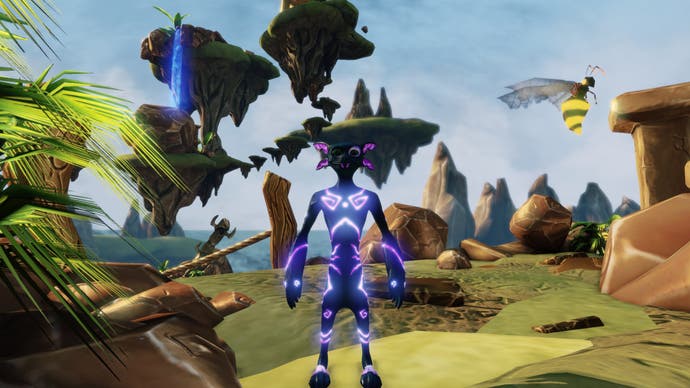
The genetics stuff comes under some serious scrutiny during the post-presentation Q&A, but the team's clearly eager to iterate further on the finer details of how the game's protagonist inherits new traits. I sense that this outfit nailed the basic game design first, and are retrofitting much of the science now; with a solid core to the project, it's safer to fiddle with everything else that goes on top. "One of the pieces of feedback we had was that our science initially wasn't very accurate," says Kurtis Richards. "So we've actually just implemented something that will bring us much closer to Mendel's law of segregation. When interacting with eggs in the game and creating new offspring, we've now tweaked things so we're offering more random chance. There's now a random chance that will affect genetic traits that you've already acquired, which is very exciting."
Just as Epic's focused on the game design, incidentally, the Wellcome Trust, which the developer's working with for the competition, is equally concerned about the science. Chatting with a few PhDs from the Sanger Institute, I try to get a sense of why everyone's taking it so seriousy. Is it less tricky to get research grants if the area you're involved with is at least something the public is aware of? One day, might games be helpful in exposing the non-trendy parts of science that don't get name-checked by a lab-coated Judge Reinhold in the exposition scenes of Hollywood blockbusters?
"I think if you work in an area of science that the public's interested in, it does make things easier for you," says Dr Carl Anderson, a Sanger geneticist who's working as a team mentor. ("It's doctor," he tells me when I ask about the correct title for him, "but if you want to accidentally type 'professor', that would be fine.") "There are definitely things, like health, that people are more aware of in their day-to-day lives, and if you're researching those things you're much more likely to come across funding and interest - it definitely helps. I think it's great that this computer game idea is around, and we can perhaps engage with an area of the public that's harder to engage with. Games are aimed at teenagers and the younger generations, and it can be hard to engage them."

Anderson's team is Static Games from Bournemouth University, and Static's taking a rather different approach from Beings or Polymorph. Tilting the camera downwards, these guys are attempting to look at genetic inheritance through the age-old lens of Theme Hospital - and they're doing all that with the help of some chickens. The result is Mendel's Farm, in which you breed poultry for fun and profit, adding utility buildings, developing new strains of bird, and speeding stuff up, if you fancy, with microtransactions.
It's a very smart demo, but what's really interesting is sitting in on a discussion afterwards and seeing how a new team copes with things like decision making. Take the graphical stuff. "From the start we wanted cartoony art, and we instantly thought: cel-shading" says Owen Chapman, who spoke so quickly during the presentation I was afraid his teeth might ignite. "As soon as we started to put our own art in, though, it just didn't work with the shadows. The colour just became splodges because there was no gradient."
"It just looked so saturated. It was unpleasant to look at. The problem with it was is that there was no way to edit it," says Ryan Pinfield, who I realise I've already marked out as the leader of the group. "There are always ways to edit things, though" counters Simon Pugnet. "It's something we can come back to again in the future." Pugnet's already typing away at his laptop as he talks, in fact. "We can always edit stuff."
"This particular game sticks very closely to the kind of Mendelian genetics you learned in high school," says Professor Anderson, with unmistakable pride and regrettable faith that I was actually listening during high school. "In terms of what the game's doing, it's trying to reinforce that stuff that you learn back then, so it's easier than tackling really complex stuff. The game's basically animal breeding and the idea that you can get variations that increase the fitness of your animals. The game's got really good potential in that you can start to layer in the more complex traits after that: interactions between different genetic variants and things like that."
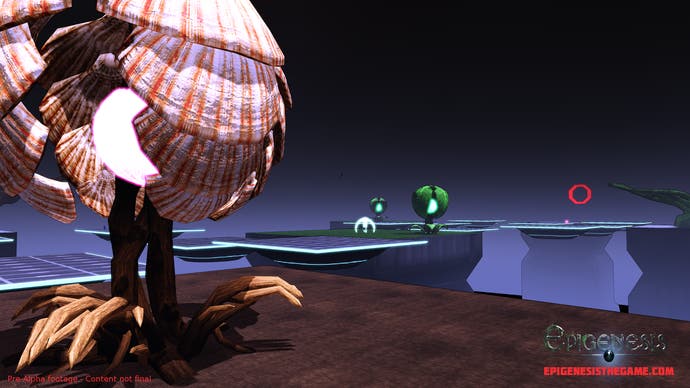
The final team hail from the Blekinge Institute of Technology, and they're a singularly ambitious group. For one thing, they've taken a brief concerning genetic inheritance and have turned it into a game built around the cutting-edge - and refreshingly confusing - field of epigenetics. (This is a bit like being asked to write an essay on basic thermodynamics and returning, several weeks later, with a fully-functioning black hole.) For another, their presentation starts with a slide showing just their studio name - Dead Shark Triplepunch - and a logo. That level of self-belief and assurance is really exciting. "Right now we're just a group of students making a cool game," says Michael Levall, the creative lead, "but we've discussed it and we really want to make a company at some point, too."
Then there's the game itself. Epigenesis is a sports offering, and a dazzlingly complex one. You're up on some stylised rooftops by the looks of things, playing futuristic basketball from a first-person perspective. There are goal hoops at either side of the map, but there are also seeds you will earn and trees across the court that you can encourage to grow in different ways by depositing those seeds nearby. It's a blend of combat, score-chasing and territory capture, and while it all looks a bit confusing from the gameplay video, it's clearly put together with a kind of clarifying confidence. "Everything was so broken when we did our first playtest," laughs Levall, "but we just sat down and said, "Okay, what couldn't the players do? They couldn't see the ball. We'll fix that. What else? They couldn't see their team, we'll fix that too." That's how it works. You really start to realise how much playtesting is worth in development."
Speaking of confidence, when I question the designers about the challenges of creating AI teams for a game in which the rules are so complex, Levall swiftly replies that they aren't ready to discuss single-player content yet. Their studio mentor looks on proudly: this is how it's done, kids.
I can really imagine interviewing members of the Epigenesis team a few years down the line at some publisher reveal and hearing that they aren't ready to talk about this or about that. What a sweet day that will be! In truth, I can imagine interviewing people from any of the four teams. The Unreal prize would be nice and everything - after all, who doesn't want to win something in the noble presence of Jason Bradbury - but I think the students have quickly realised that the real aim here is to end up with a viable game that could then be released.
Epic's eager for that to happen, too, as Mike Gamble, the company's EU territory manager, explains as the day's winding down. "People have come up to me and asked, "Can we do a Kickstarter after this, can we continue?"" he says. "Well, there's no IP ownership involved. They're inspired by the competition we've set with Wellcome, and we'd like them to acknowledge that when titles are published, but these games are their games, and if they can make a commercial release that's successful, all power to them.
"With UDK, they pay a standard UDK licence of $99, then they pay nothing until they've earned $50,000, then they pay 25 percent royalty," he continues. "They can all publish under that model. From my discussions with them, they all want to set themselves up as studios, and if they want to do Kickstarters and all that, they're probably better off thinking about professional licensing options, which will probably end up more economical for them. There are lots of options and we'll do whatever we can to bring those products to market."
There are precedents - Antichamber bubbled up through Make Something Unreal - and there's also a real sense, of course, that this is the way that a large part of game development has been going for the last few years. It's not about competitions, perhaps, but it is about small teams working with handy third-party stuff like Unreal or Unity, iterating and prototyping rapidly, and getting things in front of players while the idea's still fresh. "The smallest team here is four people, but they're building a completely viable product," says Gamble with a smile. (That subliminal tagline is working, Team Summit!) "The way Unreal has evolved over seven years, the philosophy at Epic has always been one of rapid prototyping. Fail quickly, fail often, and then get it right. That feature of the engine's not planned so much as it's an outcome of the way that Epic creates games. To see these teams of students create these games in such a short period of time is a real vindication of that. They're building real games. The teams are getting a real taste of real games development."

Maybe everyone's getting a taste, actually. Back in the Darwin Room, there's a fascinating moment during Polymorph's demo as the scientists in the crowd start to chisel away at the game's implementation of the genetics component. Without prompting, the PhDs start to throw out ideas for how inheritance could be expressed in game terms, and the designers, in response begin to discuss whether the finer strands of the scientific message are becoming rather frayed.
Right there! For a few minutes game designers are talking like geneticists and geneticists are talking like game designers. "Games is a new area for us here," explains Dr Iain Dodgeon, the Wellcome Trust's project manager for broadcasting and games as we pick over this strange entangling moment while things are wrapping up. "And yet we've found both the creators and the scientists have a real interest in what the other is doing. Neither knows the other's area very well but is interested in finding out more and understanding better. It's been a very rewarding experience from both parties, and it reminds me of a great quote from Jacques Barzun: "Science is in the strictest and best sense a glorious entertainment"."
On the train home, I turn over Dr Dodgeon's business card and find another quote printed on the back - this one from Claude Bernard: "Man can learn nothing except by going from the known to the unknown." How true, Claude. How true. Genetics, games, software development licences: a good education never truly ends.
